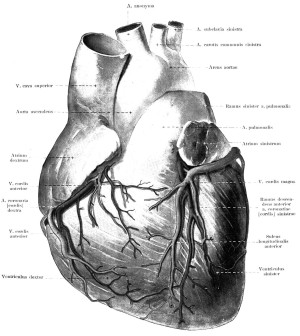- 10 Strategies to Overcome Insomnia
- Could Artificial Sweeteners Be Aging the Brain Faster?
- Techniques for Soothing Your Nervous System
- Does the Water in Your House Smell Funny? Here’s Why
- Can a Daily Dose of Apple Cider Vinegar Actually Aid Weight Loss?
- 6 Health Beverages That Can Actually Spike Your Blood Sugar
- Treatment Options for Social Anxiety Disorder
- Understanding the Connection Between Anxiety and Depression
- How Daily Prunes Can Influence Cholesterol and Inflammation
- When to Take B12 for Better Absorption and Energy
High ‘Resting’ Heart Rate Tied to Higher Odds of Early Death

A rapid “resting” heartbeat might mean you have a higher risk of dying early, researchers suggest.
“Higher resting heart rate is an independent predictor of all-cause and cardiovascular death,” said lead researcher Dr. Dongfeng Zhang, of the department of epidemiology at the Medical College of Qingdao University in Shandong, China.
Your resting heart rate, or pulse, is the number of times your heart beats a minute. When you’re seated or lying down and relaxed, a normal heart rate is between 60 and 100 beats a minute, according to the American Heart Association.
Zhang’s team analyzed 46 studies involving more than 2 million patients in all. Compared to people with the lowest resting heart rate, those with a resting heart rate of more than 80 beats a minute had a 45 percent greater risk of death from any cause, while people with a resting heart rate of 60 to 80 beats a minute had a 21 percent greater risk, they found.
However, Zhang said the absolute risk is small — that is, the odds of any one person dying from a rapid resting heart rate are low, he said. Also, the study doesn’t prove that heart rate actually caused premature deaths; it merely finds an association between the two.
“However, people should pay more attention to their resting heart rate,” he said. “These results also indicate the importance of regular physical activity that could lower resting heart rate.”
You can check your heart rate by putting your finger over your pulse and counting the number of beats in 60 seconds, the heart association says.
The report was published Nov. 23 in the CMAJ. The studies reviewed looked at all-cause deaths and deaths from heart disease.
For every 10-beats-a-minute increase in resting heart rate, risk of dying from any cause rose 9 percent, and risk of dying from heart disease increased 8 percent, the researchers found.
When resting heart rate approached 100 beats a minute — a rapid heart rate called tachycardia — risk of death from heart disease grew significantly. Tachycardia can be a sign of serious heart problems, Zhang said.
Dr. Gregg Fonarow, a professor of cardiology at the University of California, Los Angeles, said, “Further studies are needed to determine whether using the resting heart rate to predict the risk of dying has meaningful impact and whether specific interventions to lower heart rate translates into improved outcomes.”
Numerous studies have shown that higher resting heart rate is associated with increased risk of cardiovascular events and death in men and women, Fonarow said.
However, whether higher heart rate is a marker of poor physical fitness or heart disease isn’t clear, he added. A fundamental question is whether the higher heart rate is a modifiable risk factor for premature death, he said.
A fast resting heart rate can affect the body in ways that may be bad for the heart, Fonarow said.
Resting heart rate reflects the activity of the autonomic nervous system and hormone levels as well as heart fitness, he said. Increased activity of the autonomic nervous system and higher hormone levels can contribute to the start and progression of heart disease, Fonarow said.
More information
For more on heart rates, visit the American Heart Association.
Source: HealthDay
Copyright © 2026 HealthDay. All rights reserved.










